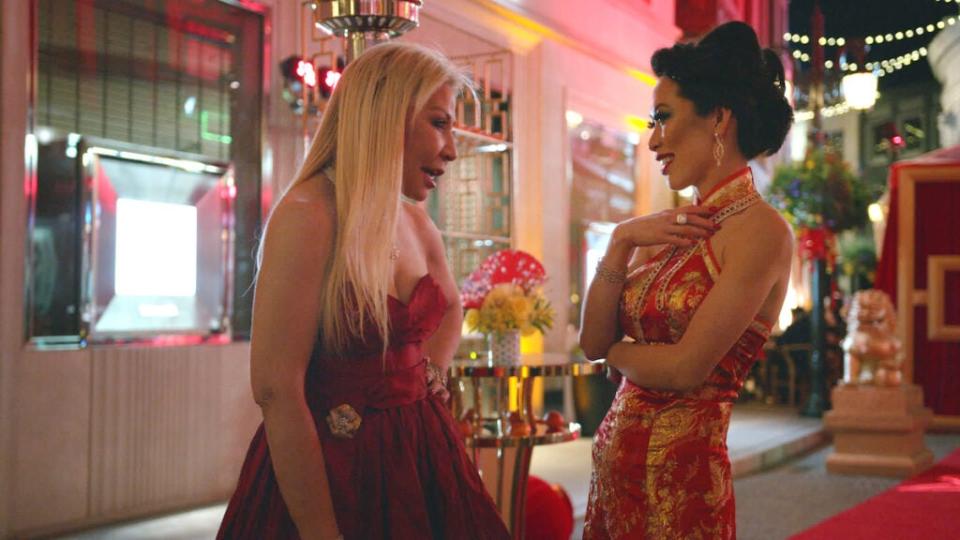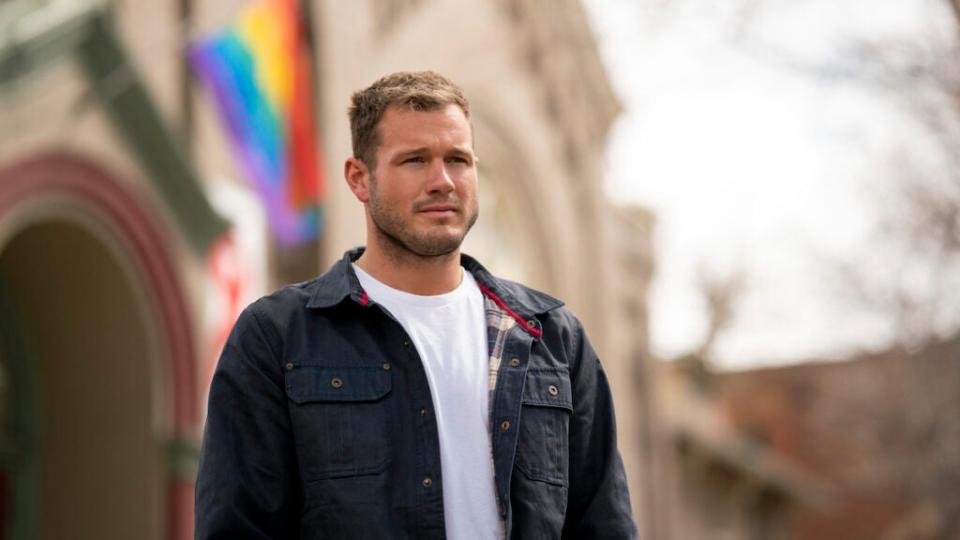Why an EP Behind ‘Kardashians’ Went Indie: ‘We Get to Tell Stories That Actually Can Help’
- Oops!Something went wrong.Please try again later.
- Oops!Something went wrong.Please try again later.
- Oops!Something went wrong.Please try again later.
- Oops!Something went wrong.Please try again later.
Jeff Jenkins made his name in unscripted television as an executive producer of E!’s “Keeping Up With the Kardashians,” among other shows. But he’d been thinking about starting his own production company for some time before exiting his position as co-president of Bunim-Murray Productions. His desire to entertain viewers and inspire meaningful conversations with his shows pushed him to take the leap.
“We get to tell stories that, once in a while, actually can help advance our human culture in a small way,” Jenkins told TheWrap for this week’s Office With a View.
That’s what he’s striving to do at Jeff Jenkins Productions, which he formed in 2018, a year after leaving Bunim-Murray, alongside 3BMG Entertainment’s CEO Ross Weintraub and Chairman Reinout Oerlemans. 3BMG co-produces the programming alongside Jenkins and his company, which operates out of 3BMG’s production offices in Sherman Oaks.
“Those are the projects I am like a heat-seeking missile on — [ones that answer] ‘What’s going to entertain, what’s going to deliver and what could have the potential to move us forward a tick?’” Jenkins said.
Also Read:
‘Bling Empire’ State of Mind: Dorothy Wang Reflects on Her New Life in NYC
The television producer, whose credits during his time at Bunim-Murray from 2001 to 2017 also include reality TV classics like “The Simple Life” and “Total Divas,” observed what he saw as a shift in the company’s goals after years of success and expansion.
“The company became very successful and very large, and when a company becomes that large, sometimes, not always, the culture can shift a little bit. Doesn’t mean it’s a bad thing, it’s just different,” Jenkins said. “I think a lot of industries over the last five to seven years have experienced a shift in culture. Some things are great, some things are frustrating. And so that shift in culture really motivated me to just go for it.
“And also, when a production company becomes a part of a huge operation, like Endemol [whose parent company, Banijay, purchased Bunim-Murray in 2010], those companies really, in my understanding, really need to sell formats, get [licensed] around the world, to really be as successful as possible,” he added. “With docuseries, it’s not quite so readily translatable to a license, so the potential to make a mega profit is much narrower.”
Bunim-Murray declined to comment about Jenkins’ assessment of its strategy.
Also Read:
Fuzzy Door Productions President Says It’s OK to Say No and Champion Projects ‘You Can Win With’
Jenkins isn’t averse to profits. But the shows he produces now aim to do it all: entertain viewers, bring eyeballs to his buyers and inspire meaningful conversations among audiences.
“I think the focus, at least when I was [at Bunim-Murray], shifted more towards formats. And although my company does produce formats,” Jenkins said, “we predominantly focus on character-driven docuseries where we’re telling real stories, stories that haven’t been told before, stories that are relatable and also hopefully that are funny and sexy and glamorous.”
Shows like Netflix’s “Bling Empire” franchise and “Coming Out Colton” benefited from their connections to zeitgeist moments and name recognition, and also helped push representation forward in the TV landscape and start meaningful conversations among global audiences, Jenkins said.
“I was on the phone with an incredibly successful female, Asian American multimillionaire entrepreneur, and she was telling me how much she believed ‘Bling Empire’ is helping Asians or Asian Americans achieve an additional measure of equality and respect. And I told her, ‘If that is even .0001% true, I can die happy,” he said.
Also Read:
Why the Creative Chief Behind ‘Queer Eye’ and ‘Legendary’ Rejects the ‘Niche’ Label
Jenkins also shared the business lesson he keeps at the forefront of his work after more than 20 years as a producer, the differences between producing reality television for streamers versus cable and advice for up-and-coming producers hoping to strike out on their own.
This interview has been edited for length and clarity.
You’ve had quite the career trajectory so far, from helping launch probably the most famous family in reality television history, the Kardashians, to starting your own company. What’s a business lesson that you’ve taken with you all throughout all these milestones?
I think being an employee of a fantastic legacy company, Bunim-Murray, was an incredible experience where I not [only] learned how to tell stories — because Mary-Ellis Bunim, who came from soap operas, was just a rabid storyteller and it had to be just right — but I also learned a lot about how to interact with buyers and what a buyer’s looking for. And, of course, some things that I kind of filed away like, “Wow, I’ll do this differently, because I have a different take on it.”
I am first and foremost about customer service as an independent little boutique production company. So if a buyer wants something extra or something that goes above and beyond, then we deliver it with no questions asked. And we are also very attentive to buyers’ needs. That’s what I would say is the business lesson that I’ve carried with me — that lesson is customer service.
At Jeff Jenkins Productions, you brought shows like “Bling Empire,” “My Unorthodox Life,” “Coming Out Colton” and more to the screen. How does your team approach deciding which cultures and subjects to focus on with your programming?
One thing that we look for is positive celebrity. I think it’s really helpful if at least one member of a cast is already famous in some way, whether that’s an athlete or a singer or a pop-culture personality. And then the other thing that we look for is what are those zeitgeist movements that seem to have really captured the imagination of the country or the planet.
With “Bling Empire,” obviously there was this excitement building about projects that would star Asian or Asian American talent. You could kind of feel that as a little earthquake coming, with the book “Crazy Rich Asians” and then the successful feature film, I think every good producer in town was like, “Oh, wow! That could be a really good reality show if you could find the right cast.”
And in that particular situation, I was extra motivated. I have a niece and nephew who were born in China and South Korea respectively, and they’re Asian American and looking around the landscape a few years ago, wow, there’s no one that looks like them on a consistent basis — certainly on reality television, there’s no one for them to even watch. So I was really determined to get that over the finish line, as a gift to them.

Talk to me about the production process of doing a show like this for a streaming service, and how it compares to doing it for a cable network.
I think the biggest difference when you are producing content for a network or a cabler [is] they have advertisers. And so with a one-hour episode in those places, network or cabler, you are creating five or six moments where there’s like a micro cliffhanger. With a streamer like Netflix, that structure is no longer necessary. So you find that the hour is just clipping along without any pauses.
In some ways, as a storyteller, that’s a relief. Because that’s a big challenge to do that six times in every episode. On the flip side, it creates a whole new set of challenges in how you get somebody to sit through 40 minutes without those kinds of ”to be continued“ moments at the end of each act.
Even Netflix is introducing ads back into streaming. So do you think that maybe that traditional structure could make a comeback?
I don’t know if subscribers will want to sit through advertising again. But I think that structure is really effective. It gets the blood pumping in the viewer. And it works for advertisers.
So sure, I think there could be a return to that. And of course, the cable [channels] and the networks are still operating that way. Not every docuseries has a huge storyline that can carry across 10 episodes. That’s like a 10-hour movie where you’re in for the reveal. That can be challenging.

Why focus on this specific type of reality television? What drew you to this genre?
I feel like my No. 1 responsibility is to entertain the viewer and deliver eyeballs for the buyer. But… if those responsibilities are met, then I feel like we get to tell stories once in a while that actually can help advance our human culture in a small way.
So a show like “Coming Out Colton” — yes, there’s lots of gay folks on television now, whether it’s scripted or unscripted. But to see a famous person, a pop culture celebrity, from ground zero come out, that to me is the type of project that gets me out of bed. Why? Because the talent is going to attract a viewer, which means we’re going to deliver eyeballs for the buyer. So our responsibilities are met.
But now we get to add to this global, cultural conversation: Here’s what it’s really like, when you’re a little bit famous, to come out of the closet to your mom, to your dad, to your pastor, to your ex-girlfriend, to your buddies in the locker room, to your coach, and it’s a mixed bag of support and disengagement. Hopefully, at least in a tiny, tiny, tiny way, we’re changing hearts and minds.
Also Read:
‘Bling Empire’ Star Christine Chiu Teases Season 2 Drama: ‘We Learn Gossip Is a Very Dangerous Game’
Is it a good time to be in the unscripted game in the industry right now?
I personally think it’s a very good time to be in the unscripted space in the industry. I think in any genre — scripted, unscripted, whatever it is — if you are passionate about telling a great story, not just recording what happens with a camera, but telling a great story that can emotionally move an audience, there’s always going to be opportunities, even as networks change, streamers change, content length changes.
I mean, we’ll probably be watching holograms in a decade, right? Who knows how the technology and the delivery systems will change? What will never change is storytelling. If you are a passionate storyteller, there’s going to be people who want to work with you.
What is your advice for people trying to make it to where you are today?
There are three small pieces of advice I would give anyone starting out. The first one is to work harder than anyone else. Hard work, long hours, focus. No. 2, the folks you come up with will become your peers in the industry as you rise. Relationships in the industry are the most important element of being a producer. Projects come and go, your relationships in this town never go away. And if you burn bridges, well, you’re going to find yourself on an island. And No. 3 is to stay humble. It’s really easy for folks to pat themselves on the back. I pat my team on the back but not myself. I feel very lucky and very blessed for all the opportunities I have. And I don’t take them for granted. If the wind blows, anything can change. So I’m very humble and very, very, very grateful.

